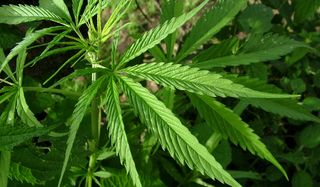Marijuana Withdrawal Is Real, Study Says

When people try to quit smoking pot, they experience real withdrawal symptoms that can affect their daily lives, a new study from Australia says.
In the study, habitual pot users who were asked to abstain for two weeks experienced irritability, sleep difficulties and other symptoms that affected their ability to work and their relationships with other people, said study researcher David Allsop, of the National Cannabis Prevention and Information Centre at the University of New South Wales.
The biggest impairment to daily life was seen among users who were the most addicted to pot, Allsop said.
Moreover, the effects of withdrawal symptoms were on par with those of people going through nicotine withdrawal, Allsop said.
The idea that cannabis can be addictive has been debated. And although it is generally accepted now that the drug can cause addiction and withdrawal, researchers were not certain whether withdrawal from the drug was severe enough to interfere with daily life, Allsop said.
In fact, cannabis withdrawal is not included as a disorder in the Diagnostic and Statistical Manual of Mental Disorders (DSM) — the bible of mental health disorders — although it is being considered for inclusion in the updated version that will be released next year. (In contrast, withdrawal from other substances, such as alcohol and cocaine, are included as disorders.)
The new findings show that doctors should be aware of the disorder, and educate patients about what symptoms they might experience when they try to quit, he said.
Sign up for the Live Science daily newsletter now
Get the world’s most fascinating discoveries delivered straight to your inbox.
"I suspect that there is a long way to go still in changing the popular beliefs," about the effects of pot on health, Allsop said. But education that withdrawal "makes you irritable, tense and anxious, and disrupts your sleep, is one good place to gain some traction," he said.
Current treatments for marijuana addiction have shown very little success in terms of their ability to get people to abstain from the drug over the long term. Withdrawal symptoms could be contributing to this low success rate, Allsop said.
Providing tailored treatments for people going through withdrawal, such as stress management and sleep medication, could improve success rates, Allsop said.
The study involved 49 men and women from Sydney who were addicted to marijuana, and used the drug more than five days a week. Participants were asked to abstain from marijuana use for two weeks. Urine samples were collected to identify those who relapsed.
Ten participants relapsed during the study. These people were more likely than those who didn't relapse to have experienced greater impairment in their daily lives from withdrawal symptoms.
The withdrawal symptoms that contributed most to impairment were: physical tension, sleep problems, anxiety, depression, mood swings and loss of appetite.
The new findings, along with previous work, suggest cannabis withdrawal should be added as a disorder to the DSM, Allsop said.
"Cannabis is the most prevalent illicit drug all around the world — including in America — and current treatment options have very limited success rates for continuous abstinence," Allsop said. "Why wouldn't you include it?"
Because the number of users who relapsed was small, more research is needed to identify which withdrawal symptoms may predict relapse, Allsop said.
The study is published today (Sept. 26) in the journal PLOS ONE.
Pass it on: Cannabis withdrawal is a real syndrome that has an impact on daily life.
Follow Rachael Rettner on Twitter @RachaelRettner, or MyHealthNewsDaily @MyHealth_MHND. We're also on Facebook & Google+.

Rachael is a Live Science contributor, and was a former channel editor and senior writer for Live Science between 2010 and 2022. She has a master's degree in journalism from New York University's Science, Health and Environmental Reporting Program. She also holds a B.S. in molecular biology and an M.S. in biology from the University of California, San Diego. Her work has appeared in Scienceline, The Washington Post and Scientific American.
Most Popular


